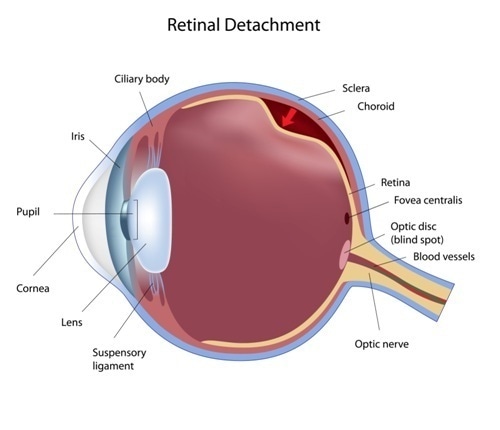The retina is the layer of the eye that contains light-sensitive nerve cells or photoreceptors. It receives and transmits light stimuli to the brain, enabling the body to see. It lines the inside of the eye, resting upon a pigmented layer called the retinal pigment epithelium (RPE). This nourishes and renews the retinal photopigments, maintaining normal visual function.
When the retina pulls away from the underlying RPE it is called a retinal detachment.

Eye condition: retinal detachment - Image Copyright: Alila Medical Media / Shutterstock
Types of retinal detachment
There are three types of retinal detachment, as described below:
Rhegmatogenous retinal detachment: This is caused by a tear or hole in the retina which allows fluid from the vitreous chamber to seep underneath the retinal layers and separate it or peel it off the RPE. This is the most common type.
Tractional retinal detachment: In this case the scar tissue on the retinal surface contracts, pulling against the RPE and creating retinal detachment. This is more often seen in diabetics, those with a history of prior retinal surgery, and inflammatory conditions which result in scarring.
Serous/exudative retinal detachment: This is caused by exudation of fluid under the intact retina, causing its detachment from the RPE. This is seen in inflammatory or traumatic conditions, which increase the rate of fluid formation.
Retinal Detachment | Signs, Symptoms and Treatment
Risk factors for retinal detachment
People who are at increased risk for this condition include those who:
- Are older than 40 years
- Are of the male gender
- Are of the white race
- Have high myopia (short sightedness) due to the possibility of a thinner-than-normal retina
- Have a history of retinal detachment in the other eye
- Have a history of cataract surgery
- Have a history of eye disorders which are associated with retinal degenerative changes
- Suffered ocular trauma
Symptoms of retinal detachment
Retinal detachment may be sudden or subacute. In either case, an increase in the number of floaters, and the appearance of light flashes in the peripheral visual fields, may occur. Floaters are dark specks which dart about in the field of vision following the direction of eye movement. They are shadows cast by the clumps of solid material in the vitreous. Light flashes are considered a more ominous symptom. Also called photopsia, they occur because the traction stimulates the nerve fibers leading from the sensory cells in the retina. They may mark a higher probability of serious central vision loss. A third symptom is the descent of a dark curtain over the field of vision. The appearance of such symptoms is an indication for an emergency eye examination by an ocular specialist.
How retinal tears are associated with retinal detachment
Retinal tears are associated with:
- Posterior vitreous detachment: This refers to the age-associated shrinkage and contraction of the vitreous. As it does so, it pulls away from the retina. In most cases, this is a smooth process. However, if the tiny fibers inside are attached to the inside of the retina too firmly, they pull too hard on the latter. If the attachment is too strong, the retina may break off at that point, creating a retinal hole or break or tear.
- Atrophic changes: A thinned-out retina is more prone to tear when traction is exerted upon it.
- Trauma to the eye such as a sudden punch: Sudden force may cause the retina to buckle and tear.
When the retina tears, a hole is formed in it. Fluid from the eye leaks through the hole to the potential space between the RPE and the photoreceptor cell layer lying above it. As these layers separate, the retina peels off and is cut off from the nourishing RPE blood vessels. If this goes on too long, the nerve cells die.
References
Further Reading
Last Updated: Feb 27, 2019